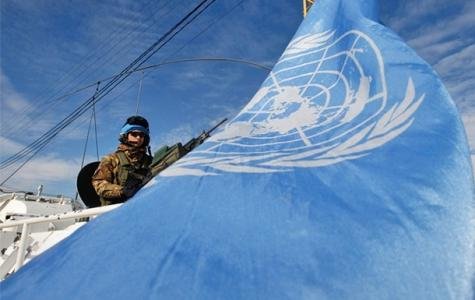 The truce reached in Minsk continues to be technically observed but weapons don’t stop to be used and the number of victims increases. The OSCE mission is not able to control the withdrawal of troops. Russia continues to provide support for separatists. Ukraine is forced to beg the EU and the UNO for peacemakers.
The truce reached in Minsk continues to be technically observed but weapons don’t stop to be used and the number of victims increases. The OSCE mission is not able to control the withdrawal of troops. Russia continues to provide support for separatists. Ukraine is forced to beg the EU and the UNO for peacemakers.
On February 18, 2015, the National Security and Defense Council following an initiative of Petro Poroshenko adopted the decision to appeal to the Security Council of the UNO and Council of the European Union with a request to send a peacemaking mission in observance of peace and security in the east of Ukraine. Thus, Kiev has drastically changed its attitude regarding foreign troops on the territory of the state. Still half a year ago the president Poroshenko dogmatically claimed that “there would be no peacemaking troops in the territory of Ukraine. End of story.” What did affect on such a drastic change of the position?
The unvarnished incompliance of the ceasefire became the first reason. Active armed hostilities from the separatists’ side in Debaltseve, Kramatorsk and Mariupol dispelled illusions on reliability of the signatures put under the truce in the capital of Belorussia.
Arms deliveries from Russia and incompliance of the requirements regarding withdrawal of troops indicated that the Kremlin is not going to adhere to these agreements just like the previous ones. Moscow continues to ignore statements of the NATO about the Russian presence in Eastern Ukraine and support of the separatists and the request to “withdraw all its troops from Eastern Ukraine and respect the Minsk agreements.”
The special monitoring mission of the OSCE stays unable to perform the supervising functions it was entrusted with during negotiations in Minsk in the full measure. Separatists prevent admittance of inspectors to the territories that they control, the Ministry of Foreign Affairs of Ukraine asserts. The Minister of Foreign Affairs Pavel Klimkin noted that “they constantly prevent officials of the OSCE mission from going there. We have tons of various data that they hide equipment in sheds and abandoned plants. We appealed to the OSCE many times with a request to verify this information. The OSCE officials either were not let to pass there or could not come there out of safety considerations.”
The absence of effective sanctions and military support together with the ongoing threat from the Russian Federation and inefficiency of peaceful agreement forced Kiev to look for a new way of increasing of responsibility of the West in arrangement of the conflict in Donbass. This way appeared to be direct involvement of the European and world’s community in the form of a peacemaking mission. However, despite the decisive moves of Ukraine, the EU and the UNO do not hurry to send their soldiers to the firing line.
The EU Commissioner in the matter of European Neighborhood Policy and Enlargement Negotiations Johannes Han sharply commented on the Ukrainian initiatives. “President Poroshenko made suggestions, offered certain initiatives. But our understanding includes the necessity to focus on concrete implementation of the Minsk agreements and there is no need to speculate regarding other possibilities. Let us focus on the Minsk agreements,” Han stated. He also noted that the OSCE could self-sufficiently aid to reach peace in Donbass.
In his turn the Head of the Foreign Ministry of Germany Steinmeier emphasized that it makes sense to send peacekeepers only in case all sides of the conflict support their assignment.
The official Moscow didn’t go any far from its European colleagues in its reasoning. In Russia, it was said many times that there is no need for such a mission, but they insisted that attention should be paid to compliance of the already achieved agreements. “We believe that there are the Minsk agreements, where role of the OSCE and its monitoring mission is clearly determined. At the present it is better to make sure that this monitoring mission works effectively and observes compliance of the Minsk agreements. This is quite sufficient for now,” the representative of the Ministry of Foreign Affairs of the Russian Federation Genadiy Gatilov stated.
The position of Moscow regarding sending the peacemakers is decisive. The fact that such a mission can be sent only with the approval of the Security Council of the UNO, where Russia has the right of veto, minimizes the possibility of sending the peacekeeper troops. The only possibility remains only in case when demands of the Kremlin are met, what makes the mission not only senseless but even dangerous.
The problem also is that even if it is possible to convince Europe and bypass Russia, then, according to the Ministry of Foreign Affairs of Ukraine, deployment of such a mission will take “6 – 7 months”. Providing activity of the Russian Federation, Ukraine shouldn’t rely solely on this option, it is necessary to look for ways of reinforcing own positions and insist on more active support of the world’s community.
Andrey Trutenko










